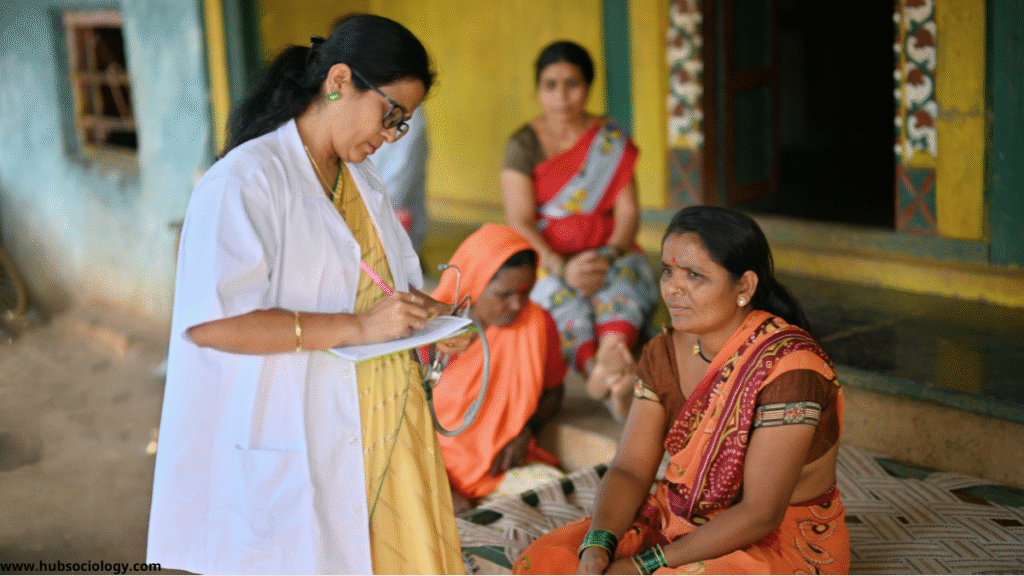Introduction on ICT and Rural Health Care
Information and Communication Technology (ICT) has emerged as one of the most transformative tools of the 21st century, shaping economies, education, governance, and health systems. Health care, being a vital component of social well-being, has been profoundly influenced by ICT. However, the impact of ICT is not uniform across different social settings. In rural societies, where geographical isolation, poverty, illiteracy, and inadequate infrastructure dominate, ICT offers new possibilities to bridge health disparities. From telemedicine to mobile health applications, ICT creates opportunities to enhance accessibility, affordability, and quality of health care services.
From a sociological perspective, the integration of ICT and rural health care is not merely a technological phenomenon—it represents a social transformation. It involves changes in social relationships, community structures, cultural perceptions of health, and the role of state and non-state actors in delivering welfare. To fully understand its significance, one must analyze ICT and rural health care within the framework of sociology: inequality, social inclusion, modernization, and social capital.

Table of Contents
Rural Health Care Challenges in Sociological Context
Rural societies, especially in developing nations like India, face multiple structural challenges in health care delivery. These challenges are deeply rooted in social, economic, and cultural conditions:
- Accessibility and Distance – Villages often lack hospitals, diagnostic centers, and trained doctors. Patients may need to travel long distances, which discourages early medical intervention.
- Economic Inequality – Poverty and unemployment reduce the ability of rural people to afford private care. Public health infrastructure, though available, is often inadequate.
- Cultural Beliefs and Traditions – Traditional healing practices and reliance on local healers sometimes delay scientific treatment.
- Shortage of Health Professionals – Rural areas experience a “brain drain,” where doctors and nurses prefer urban postings due to better facilities and higher salaries.
- Gender and Caste Inequalities – Women, children, and marginalized groups often face additional barriers in accessing health care due to social hierarchies and discriminatory practices.
- Information Gap – Lack of health awareness and limited access to knowledge about preventive care aggravate the rural health crisis.
In such a context, ICT acts as a potential equalizer, enabling rural societies to overcome structural barriers.
Role of ICT in Rural Health Care
ICT in health care includes telemedicine, mobile health (mHealth), electronic health records (EHRs), online consultations, digital awareness campaigns, and health data management. Its role in rural health care can be analyzed sociologically:
1. Bridging the Urban-Rural Divide
ICT reduces the geographical divide by connecting rural patients with urban health centers. Telemedicine enables virtual consultations, reducing the need for physical travel. Sociologically, this strengthens the integration of rural societies into the national health system, thereby reducing their marginalization.

2. Empowering Rural Communities through Information
Knowledge is power. ICT enables the dissemination of vital health information related to maternal health, nutrition, sanitation, vaccinations, and infectious diseases. Health awareness campaigns through SMS, WhatsApp, or radio programs transform community behavior. This shift reflects the process of social change where modern health practices gradually replace traditional beliefs.
3. Promoting Inclusivity and Equality
ICT facilitates access to services for marginalized groups. For example, government-run telehealth centers or mobile health vans use ICT tools to reach women, elderly, and economically weaker sections. From a sociological viewpoint, this fosters social justice and inclusive development.
4. Strengthening Social Capital
In rural areas, health interventions through ICT often rely on community networks—self-help groups, women’s collectives, and NGOs. These groups serve as mediators between technology and society, thus reinforcing community solidarity.
5. Transforming Role of Health Professionals
ICT changes the doctor-patient relationship. Rural health workers, such as ASHA workers in India, become intermediaries who use ICT devices to transmit patient data to specialists. This redistribution of roles redefines authority, trust, and power structures in health care.
Case Studies and Practical Examples
- Telemedicine Projects in India – The Indian Space Research Organisation (ISRO) has implemented telemedicine networks connecting rural hospitals with super-specialty hospitals in cities. This reduces rural patients’ dependency on urban migration.
- mHealth Applications – Mobile apps like mSakhi and Mobile Seva provide maternal and child health services. SMS alerts inform pregnant women about check-ups, vaccinations, and nutrition.
- Digital Health Mission – The Government of India’s Ayushman Bharat Digital Mission seeks to create a digital health ID for every citizen, which will be a game-changer for rural health records and accessibility.
- Global Examples – In African countries, SMS-based reminders for HIV/AIDS medication have improved adherence to treatment. Such ICT-based interventions highlight the universality of digital solutions for rural health care.
Sociological Theories and ICT in Rural Health
To deepen the analysis, some sociological theories can be applied:
- Modernization Theory – ICT symbolizes modernization and the diffusion of innovations. Rural societies adopting ICT-based health care are integrating into the broader process of development.
- Conflict Theory – ICT may also reinforce inequalities if access is limited to wealthier or more literate villagers. Unequal access to technology creates a “digital divide” within rural communities.
- Functionalist Perspective – ICT in rural health care functions as a social institution that ensures equilibrium by reducing mortality, preventing diseases, and sustaining the labor force.
- Symbolic Interactionism – ICT tools change the way rural people perceive health and illness. For instance, online consultations may reshape notions of trust in doctors and the meaning of “treatment.”
Benefits of ICT in Rural Health Care
- Improved Accessibility: Reduces travel time and cost.
- Timely Intervention: Enables early diagnosis and preventive care.
- Cost-effectiveness: Saves money for both patients and government.
- Capacity Building: Trains health workers with online resources.
- Pandemic Response: During COVID-19, ICT played a vital role in rural awareness, vaccination drives, and remote consultations.
Challenges in ICT-based Rural Health Care
Despite its potential, ICT faces significant barriers in rural contexts:
- Digital Divide – Lack of internet connectivity, smartphones, and digital literacy restricts its use.
- Cultural Resistance – Some communities remain skeptical of digital consultations.
- Infrastructure Gaps – Power shortages, poor network coverage, and lack of trained personnel.
- Privacy Concerns – Handling of personal health data raises ethical and legal questions.
- Sustainability – Many ICT projects fail after initial funding ends, highlighting the need for long-term planning.
Future Prospects on ICT and Rural Health Care
The future of ICT in rural health care lies in integrating technology with social policy. Some key directions include:
- Strengthening Digital Literacy: Training villagers, especially women and youth, to use health apps.
- Community Participation: Involving local leaders to build trust in ICT interventions.
- Public-Private Partnerships: Combining government support with private innovation.
- AI and Big Data: Using artificial intelligence for predictive health care and personalized medicine in rural areas.
- Sociological Research: Studying the cultural adaptation of ICT in rural health care to design context-sensitive policies.
Conclusion on ICT and Rural Health Care
ICT in rural health care is not merely about technology—it represents a social revolution. It challenges traditional barriers of geography, inequality, and exclusion by making health care more inclusive and accessible. From a sociological perspective, ICT becomes an agent of social change, empowering marginalized communities, reshaping social roles, and reducing health inequalities.

Yet, the success of ICT in rural health care depends on addressing the digital divide, cultural resistance, and sustainability challenges. A people-centered approach, rooted in community participation and social equity, is essential. If implemented inclusively, ICT can transform rural health care into a more just, efficient, and sustainable system, bridging not only the technological gap but also the social gaps that define rural societies.
Do you like this this Article ? You Can follow as on :-
Facebook – https://www.facebook.com/hubsociology
Whatsapp Channel – https://whatsapp.com/channel/0029Vb6D8vGKWEKpJpu5QP0O
Gmail – hubsociology@gmail.com
Topic-Related Questions on ICT and Rural Health Care
5 Marks Questions on ICT and Rural Health Care
- Define ICT in the context of rural health care.
- Mention any two major challenges of rural health care in India.
- What is telemedicine, and how does it help rural patients?
- Write two sociological benefits of ICT in rural health care.
- State any two limitations of ICT in rural health care.
10 Marks Questions on ICT and Rural Health Care
- Explain how ICT helps in bridging the urban-rural health divide.
- Discuss the role of mobile health (mHealth) in improving maternal and child health in rural areas.
- How does ICT strengthen community participation and social capital in rural health care?
- Examine the impact of ICT on the role of health workers in rural society.
- Analyze rural health care challenges from a sociological perspective.
15 Marks Questions on ICT and Rural Health Care
- Critically evaluate the role of ICT in reducing inequalities in rural health care with suitable examples.
- Discuss the application of sociological theories (Modernization, Conflict, Functionalist, and Symbolic Interactionism) in understanding ICT and rural health care.
- “ICT in rural health care is not only a technological intervention but a social transformation.” Discuss with reference to India.
- Explain the challenges of implementing ICT-based health care in rural areas and suggest sociologically appropriate solutions.
- Assess the future prospects of ICT in rural health care with reference to social inclusion and development.
